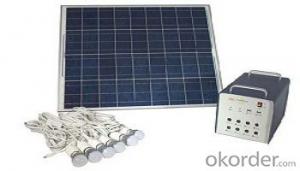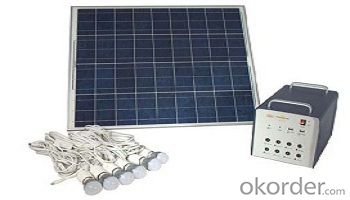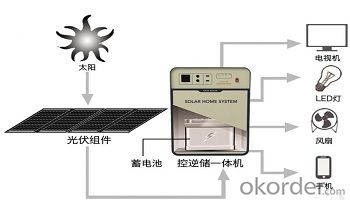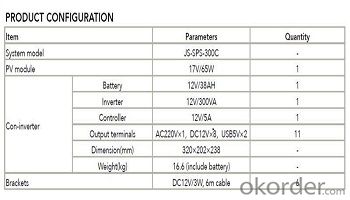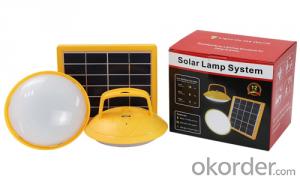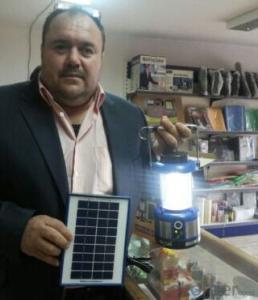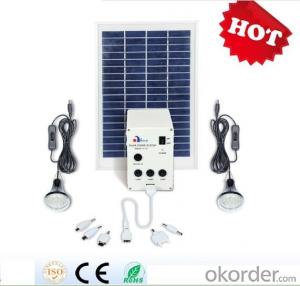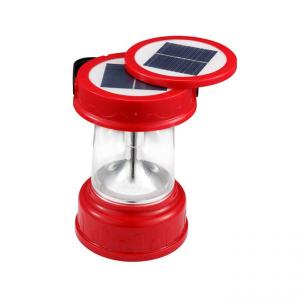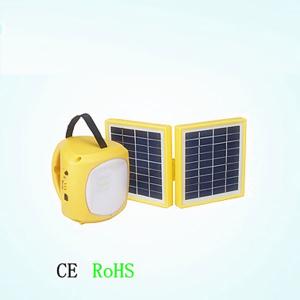Ongrid Solar Energy Systems - Sunpower Solar Module with LED Lighting and Mobile Phone Charger
- Loading Port:
- China main port
- Payment Terms:
- TT OR LC
- Min Order Qty:
- 10 watt
- Supply Capability:
- 100000 watt/month
OKorder Service Pledge
OKorder Financial Service
You Might Also Like
Product Description:
Name: SPS-300C sunpower solar module
Solar power system provides alternating current and direct current, which is produced by the modules transforming solar power into power, to home lighting, household appliance and other DC appliance, such as cell phone and laptop.
Solar power system is widely used in area lack of power, for example house power supplying, monitoring, communication base, fire prevention in forest area, pasture and meadow, aquaculture etc.
Solar DC Lighting System
Multiple protection system, safe and reliable performance.
Integrated and portable design, easy operation.
DC5V, DC12V, AC220V output, wide range application.
Clean engergy, cycle use.
Packaging & Delivery:
Packaging Detail: Quantity of carton :3pcs Color Box size: 28.5*11.5*12187.5px , 2.66kg/pc Carton size: 36.5*31*14375px G.W/N.W: 8.7/8.0 kg
Delivery Detail: 25 working days according to order quantity
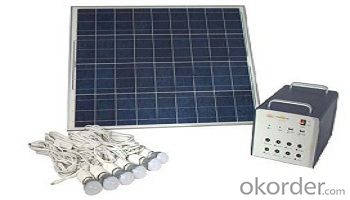
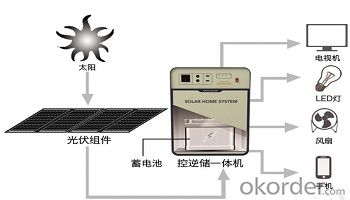
Advantages:
1.Solar Energy&green energy.
2. Easy to install, operate and maintain.
3. Ideal lighting products where normal electric is not convenient.
Packing details:
Quantity of carton :3pcs
Color Box size: 28.5*11.5*12187.5px ,
2.66kg/pc
Carton size: 36.5*31*575cm
G.W/N.W: 8.7/8.0 kg
Our services:
1. Sample: Sample is available. Please send us email about your detail consignee information: name, address, zip code and tel. Then we will contact you and send samples to you.
2. Small order: We can accept small order for this product. Please let us know your order quantity.
3. Customize: We accept OEM service and can customize products as customers' design.
4. After-sales service: We will give customers active feedback within 24hours after receive any of customers' questions
- Q: Can solar energy systems be used in areas with limited access to solar grounding equipment?
- Yes, solar energy systems can still be used in areas with limited access to solar grounding equipment. Grounding is an important safety measure in solar installations, but there are alternative methods available to ensure the safety and functionality of the system. These methods may include using ground-mounted solar arrays, ground screws, or other grounding techniques that do not require extensive equipment or infrastructure. It is important to work with experienced solar professionals who can provide suitable solutions based on the specific circumstances and limitations of the area.
- Q: Can a solar energy system be installed on a building with a clay tile roof?
- Yes, a solar energy system can be installed on a building with a clay tile roof. Special mounting systems are available that allow solar panels to be securely attached to clay tile roofs without damaging the tiles. It is important to hire experienced professionals who are familiar with installing solar systems on clay tile roofs to ensure a proper and safe installation.
- Q: Can solar energy systems be used for powering electric bike charging stations?
- Indeed, electric bike charging stations can be powered by solar energy systems. The installation of solar panels on the roofs or in close proximity to the charging stations allows for the absorption of sunlight and its conversion into electricity. Consequently, this renewable energy source can be harnessed to charge the batteries of electric bikes. Through the employment of solar power, electric bike charging stations can function autonomously, minimizing dependence on fossil fuels and lessening carbon emissions. Moreover, solar energy systems present an economical and environmentally-friendly option for powering electric bike charging infrastructure.
- Q: How do solar energy systems impact the insurance coverage of a home?
- Solar energy systems can have both positive and negative impacts on the insurance coverage of a home. On the positive side, installing solar panels can increase the value of a home, which may result in higher replacement costs in the event of damage or loss. This can lead to higher insurance coverage limits to ensure adequate protection. Additionally, some insurance companies offer discounts or incentives for homeowners who install solar energy systems. These discounts can help offset the cost of insurance premiums and make it more affordable for homeowners to insure their homes. However, there are also potential negative impacts to consider. Solar panels can be vulnerable to damage from natural disasters such as storms, hail, or fire. Depending on the insurance policy, the coverage for such damages may vary. Some policies may include coverage for solar panels as part of the overall structure of the home, while others may require an additional endorsement or separate policy. Another consideration is liability coverage. If a solar energy system causes damage to neighboring properties or injures someone, homeowners may need to ensure they have adequate liability coverage to protect against potential lawsuits. It is important for homeowners to review their insurance policies and consult with their insurance providers before installing solar energy systems. This will ensure that they have the appropriate coverage in place and understand any potential changes or requirements that may affect their insurance premiums or coverage limits.
- Q: How does the quality of solar panels impact energy production?
- Energy production is directly impacted by the quality of solar panels. When solar panels are of high quality, they are designed to efficiently convert sunlight into electricity, resulting in increased energy production. These panels utilize advanced technology and high-grade materials that maximize the absorption and conversion of solar energy. In contrast, low-quality solar panels may have lower efficiency and durability. They are often made with cheaper materials and less advanced technology, which leads to a decrease in energy production capacity. These panels are not capable of capturing and converting as much sunlight into usable electricity, resulting in reduced energy output. Furthermore, the lifespan and reliability of solar panels are also influenced by their quality. High-quality panels are typically constructed to withstand harsh weather conditions and have longer warranties, ensuring consistent energy production over many years. On the other hand, low-quality panels tend to degrade faster and have shorter lifespans, leading to a decline in energy production over time. Therefore, it is crucial to invest in high-quality solar panels to maximize energy production and guarantee long-term performance. Although the initial cost may be higher, the increased efficiency and durability of high-quality panels often lead to greater energy savings and a quicker return on investment.
- Q: Can solar energy systems be used for powering electric bikes or scooters?
- Yes, solar energy systems can be used to power electric bikes or scooters. Solar panels can be installed on the roofs of buildings or on the bikes/scooters themselves to harness sunlight and convert it into electricity. This renewable energy source can charge the battery of the bike or scooter, providing an eco-friendly and sustainable power source for transportation.
- Q: How do solar energy systems impact the reliability of the electricity supply?
- Solar energy systems can have a positive impact on the reliability of the electricity supply. By diversifying the energy sources used for generating electricity, solar systems can help reduce dependence on traditional power plants, which are susceptible to outages and disruptions. Additionally, solar energy is abundant and renewable, meaning it can provide a consistent and reliable source of electricity as long as sunlight is available. However, the intermittent nature of solar power can pose challenges, especially during nighttime or cloudy days. To mitigate this, advanced grid management techniques and energy storage systems are being developed to ensure a reliable electricity supply even when solar generation is limited.
- Q: Can solar energy systems be used in rural areas without access to the grid?
- Solar energy systems are definitely able to be utilized in rural areas that lack access to the grid. In reality, solar power can serve as an ideal solution for off-grid locations as it captures energy from the sun and converts it into electricity without relying on conventional power sources. Sunlight can be captured by installing solar panels on rooftops or in open spaces, which can then be converted into usable electricity through an inverter system. This electricity can be utilized to power a wide range of appliances and devices, providing electricity for lighting, charging mobile phones, operating small appliances, and even powering agricultural equipment or water pumps. Furthermore, any excess energy generated during the day can be stored in batteries for use during nighttime or overcast days. Solar energy systems present a sustainable and dependable electricity source for rural communities, decreasing their reliance on costly and unreliable generators that run on fossil fuels or traditional power grids.
- Q: Are solar energy systems suitable for all locations?
- No, solar energy systems are not suitable for all locations. The feasibility and efficiency of solar energy depend on various factors such as the amount of sunlight received, the availability of space for installing panels, and the local climate. Regions with low sunlight or frequent cloudy weather may not be ideal for solar energy systems. Additionally, areas with limited space or high levels of shading may also face challenges in harnessing solar power effectively.
- Q: Can solar energy systems be used to power electric vehicles?
- Yes, solar energy systems can be used to power electric vehicles. Solar panels can be installed on the roof of a vehicle or in a stationary location to capture sunlight and convert it into electricity. This electricity can then be used to charge the batteries of electric vehicles, providing a clean and renewable source of energy for transportation.
Send your message to us
Ongrid Solar Energy Systems - Sunpower Solar Module with LED Lighting and Mobile Phone Charger
- Loading Port:
- China main port
- Payment Terms:
- TT OR LC
- Min Order Qty:
- 10 watt
- Supply Capability:
- 100000 watt/month
OKorder Service Pledge
OKorder Financial Service
Similar products
Hot products
Hot Searches
Related keywords
